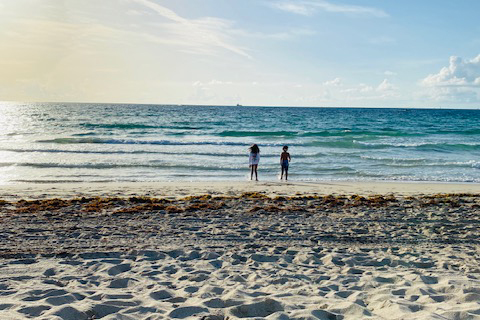Norma Schwartz doesn’t have the heart to tell her two kids, Max, 9, and Izabella, 11, that they will not be going back to school this fall … well, not right away, at least.
“I anticipate it to be a hard conversation,” she said. “Because we went from, ‘OK, we just have to get through these couple weeks’ to them being so excited to go back, but we don’t anticipate them going back to the classroom until October.”
Starting August 31, her two kids will resume distance learning. But they don’t know it yet. She plans to tell them soon, though, as the school year draws closer.
Schwartz and her family live in Florida’s Miami-Dade County, where nearly 120,000 people have tested positive for the coronavirus and the state’s largest teachers’ union sued the governor and education commissioner over plans to send students back to school in the middle of a pandemic.
“It’s been a little stressful to see what will happen in the fall,” said Schwartz. “But at the same time, I never knew things would get so bad in community. It’s been scary for us.”
Search for normalcy
Like most parents, Schwartz spent the majority of the last few months keeping herself abreast of all the latest developments in her school district, the few that there were, while also trying to give her children a somewhat normal summer break.
The family decided to “sit this one out” and stay in Miami for the summer — no road trips, no play dates, no summer camp. Her oldest, however, is participating in a virtual summer camp, where she’s sent a box of activities to do with other kids located all over the country via Zoom. Movie nights also became a frequent thing. Schwartz screens various documentaries on topical issues to teach her kids what’s going on culturally. They did find a way to “sneak around” Miami while still being safe: The whole family would wake up at 6 a.m. and head to the beach and spend an hour swimming and playing in the ocean before it got too crowded.
“As soon as we saw someone else, we would hoof it back home,” she said.

Some parents in her circle brought up the idea of creating “pandemic pods” — a group of kids that would only see and socialize with each other, no one else. At first, she thought this was a good idea: Her children frequently talked about how much they miss their friends. But Schwartz said she quickly opted out of the pod conversation as the news about the coronavirus got continually worse.
“Things just started escalating in the community, and no one wanted to be that one family that got everyone sick because we couldn’t keep to ourselves,” she said.
More challenges ahead
For Schwartz, it didn’t matter whether or not Miami-Dade reopened classrooms or continued on with online learning only: She wasn’t going to send her kids back anyway, especially with COVID-19 cases she described as “sky-high.”
“If the conditions are the same as they’ve been, I am not sending them,” she said. “I need the assurance that everyone is speaking the same language.”
“If the conditions are the same as they’ve been, I am not sending them.”
As it stands now, Miami-Dade County Public Schools will be online only at first. The school district will decide on September 30 whether or not kids will be phased into classrooms starting in October based on need. Schwartz said the school district also came out with new software for distance learning to provide some cohesion between coursework. This is in contrast to this past spring, when Schwartz opted her kids out of participating in their electives due to the sheer amount of time they were spending staring at screens.
Another semester of distance learning may prove challenging, just like it did when it was sprung on her in March, but Schwartz said right now she doesn’t think about it as much: Back to school hardly weighs as heavy on her mind as the current state of public health in her county. Schwartz said she would feel much more comfortable sending her children back to school if coronavirus testing in Florida was more efficient.
“If testing was something I could access, as a parent, for my children, I wouldn’t worry,” she said. “But I think we will be successful getting through this as long as our mental health stays intact. They may lose the academic muscle, but they also learned a lot of other things by being at home. These will be interesting kids when they come out of this.”
Editors' Recommendations
- With coronavirus on campus, college freshmen face a disorienting orientation
- Social distance and senioritis: Graduating high school in 2020




